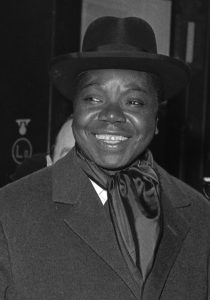Assassinations of African presidents have left deep marks on history, politics, and society. From coups to internal betrayals, these leaders were taken at the peak of power, often altering the trajectory of their nations.
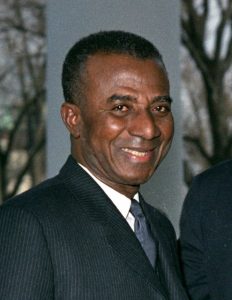
The first African president to be assassinated after independence was Sylvanus Olympio of Togo in 1963, who was killed during a military coup shortly after leading his country to freedom.
Since then, several other prominent African leaders, including Thomas Sankara of Burkina Faso, Anwar Sadat of Egypt, and Muammar Gaddafi of Libya, have met similar fates, each leaving behind a legacy intertwined with both progress and turmoil.
This article explores the stories of ten African presidents who were assassinated, examining their leadership, the circumstances of their deaths, and the lasting impact on their countries and the continent. Africa’s post-independence history has been marked by both remarkable achievements and tragic losses. Among the most shocking events are the assassinations of sitting presidents, acts that not only ended the lives of influential leaders but also altered the political trajectory of entire nations.
Who Was The African President That Was Assassinated?
1. Sylvanus Olympio – Togo (1963)

Caption: Sylvanus Olympio, Togo’s first president, assassinated in 1963
Sylvanus Olympio, Togo’s first president, was assassinated on 13 January 1963 during a military coup. He led Togo to independence and is remembered as a symbol of anti-colonial leadership.
Legacy: Olympio’s assassination highlighted the fragility of African democracies immediately after independence. He is remembered as a pioneer of democratic governance and national unity.
Pros: First post-independence leader, Advocate for democracy, Inspired independence movements, Modernized Togo’s economy, Promoted national unity, Anti-colonial leader, Courageous reformist
Cons: Overreliance on military loyalty, Limited political allies, Vulnerable to coups
2. Thomas Sankara – Burkina Faso (1987)
 Caption: Thomas Sankara, revolutionary leader of Burkina Faso, assassinated in 1987
Caption: Thomas Sankara, revolutionary leader of Burkina Faso, assassinated in 1987
Thomas Sankara, known as “Africa’s Che Guevara,” was assassinated on 15 October 1987 during a coup. He implemented sweeping reforms including land redistribution, women’s rights, and anti-corruption measures.
Legacy: Sankara’s assassination halted major progressive reforms in Burkina Faso. His revolutionary vision continues to inspire African activists and politicians.
Pros: Revolutionary leader, Promoted women’s rights, Anti-corruption advocate, Environmental initiatives, Charismatic leadership, Pan-Africanist, Social reforms
Cons: Radical reforms provoked opposition, Political enemies within military, Short tenure
3. Laurent-Désiré Kabila – Democratic Republic of the Congo (2001)
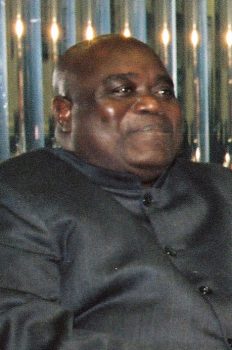
Caption: Laurent-Désiré Kabila, President of DRC, assassinated in 2001
Kabila was assassinated on 16 January 2001 by a bodyguard at the Palais de Marbre in Kinshasa. He led the overthrow of Mobutu Sese Seko and became president during a turbulent period.
Legacy: His assassination demonstrated the dangers of internal betrayal. It also reshaped Congo’s political landscape, leading to his son Joseph Kabila taking over.
Pros: Overthrew dictatorship, Nationalist leader, Advocated reform, Courageous military strategist, Anti-colonial activist, Influential in regional politics, Symbol of resistance
Cons: Security vulnerabilities, Controversial governance, Internal dissent
4. Mohamed Boudiaf – Algeria (1992)
 Caption: Mohamed Boudiaf, Algerian reformist leader, assassinated in 1992
Caption: Mohamed Boudiaf, Algerian reformist leader, assassinated in 1992
Mohamed Boudiaf was assassinated on 29 June 1992 while addressing a public event. He returned from exile to lead reforms after decades of political turmoil.
Legacy: His death emphasized the risk of political violence during transitional periods. He is remembered for his reformist ideals and commitment to stabilizing Algeria.
Pros: Reformist leader, Returned from exile to serve, Advocated national reconciliation, Promoted democracy, Courageous in public service, Anti-corruption stance, Symbol of hope
Cons: Vulnerable to insider attacks, Limited political protection, Short-lived reforms
5. Samuel Doe – Liberia (1990)
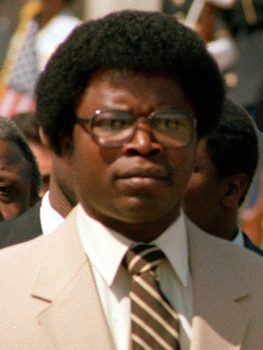 Caption: Samuel Doe, former President of Liberia, assassinated in 1990
Caption: Samuel Doe, former President of Liberia, assassinated in 1990
Samuel Doe seized power in 1980 but was later assassinated during the First Liberian Civil War in 1990. His rule was marked by ethnic tensions and political violence.
Legacy: Doe’s assassination signaled the deep-rooted instability in Liberia and intensified civil war. His death paved the way for prolonged conflict.
Pros: Military leadership, Economic reforms attempted, Strong political presence, Asserted national control, Influenced regional politics, Early nationalist initiatives, Recognized internationally
Cons: Ethnic favoritism, Violent repression, Weak democratic institutions
6. Anwar Sadat – Egypt (1981)
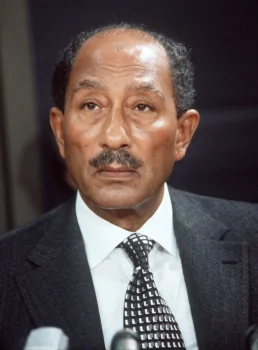
Caption: Anwar Sadat, President of Egypt, assassinated in 1981
Anwar Sadat was assassinated on 6 October 1981 during a military parade. He signed the Egypt-Israel peace treaty, angering extremist factions.
Legacy: His death demonstrated the risks faced by leaders pursuing peace and reform. Sadat’s assassination had global political consequences.
Pros: Peace advocate, Economic reforms, Modernized military, Charismatic leader, Strong international relations, Courageous vision, Symbol of reconciliation
Cons: Controversial peace policies, Targeted by extremists, Security lapses
7. Muammar Gaddafi – Libya (2011)
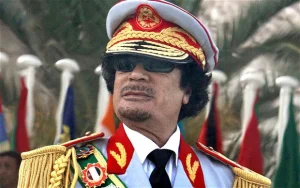
Caption: Muammar Gaddafi, Libyan leader, assassinated in 2011
Gaddafi was killed on 20 October 2011 during the Libyan Civil War. His 42-year rule was marked by autocracy and international conflicts.
Legacy: Gaddafi’s death ended decades of authoritarian rule but triggered prolonged instability in Libya. He remains a polarizing figure.
Pros: Long-time ruler, Strong national influence, Advocated pan-African initiatives, Resisted foreign intervention, Charismatic leadership, Economic modernization, Symbol of defiance
Cons: Autocratic rule, Human rights violations, Caused civil unrest
8. Juvénal Habyarimana – Rwanda (1994)
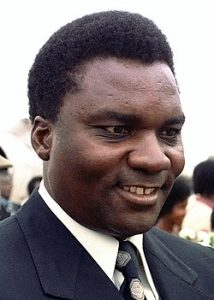 Caption: Juvénal Habyarimana, former President of Rwanda, assassinated in 1994
Caption: Juvénal Habyarimana, former President of Rwanda, assassinated in 1994
Habyarimana’s assassination on 6 April 1994 by a missile attack triggered the Rwandan genocide. He had ruled Rwanda for over two decades.
Legacy: His death sparked one of the deadliest genocides of the 20th century. It demonstrated the extreme consequences of political assassinations.
Pros: Long-term governance, Centralized administration, National economic growth, Strong regional influence, Military background, National unity policies, Experienced politician
Cons: Ethnic favoritism, Human rights abuses, Death triggered genocide
9. Samora Machel – Mozambique (1986)
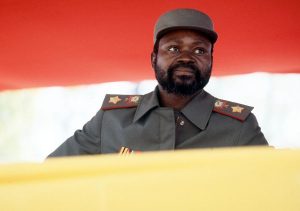
Caption: Samora Machel, first President of Mozambique, assassinated in 1986
Samora Machel died in a plane crash on 19 October 1986, widely believed to be politically motivated. He led Mozambique to independence and introduced socialist reforms.
Legacy: His death disrupted Mozambique’s stability and foreign policy. Machel is celebrated for anti-colonial leadership.
Pros: Independence leader, Socialist reforms, Anti-colonial fighter, Pan-African advocate, Economic planning, Charismatic presence, Inspirational leader
Cons: International tensions, Security vulnerabilities, Sudden death
10. Moïse Tshombe – Democratic Republic of the Congo (1969)
Caption: Moïse Tshombe, former Prime Minister of Congo, assassinated in 1969
Tshombe was assassinated on 29 June 1969 while in exile in Spain. He was the former Prime Minister during Congo’s secessionist period.
Legacy: His assassination ended hopes of political reconciliation in Congo during a turbulent post-colonial era.
Pros: Secessionist leadership, Regional influence, Negotiator in political crises, Prominent Congo figure, Business and political connections, International recognition, Early independence efforts
Cons: Exiled, Controversial policies, Political opposition
Who Was The African President That Was Assassinated? FAQs:
1. Which African president was the first to be assassinated after independence?
The first widely recognized assassination of an African president after independence was Sylvanus Olympio of Togo in 1963. He was killed during a military coup shortly after leading Togo to independence.
2. Who was known as “Africa’s Che Guevara” and assassinated in Burkina Faso?
Thomas Sankara, the revolutionary leader of Burkina Faso, was assassinated in 1987. He is remembered for his progressive reforms and Pan-Africanist vision.
3. Which president’s assassination triggered the Rwandan genocide?
The assassination of Juvénal Habyarimana of Rwanda in 1994 triggered one of the deadliest genocides of the 20th century, leading to mass killings in the country.
4. Who was the Egyptian president assassinated for signing a peace treaty with Israel?
Anwar Sadat, the president of Egypt, was assassinated in 1981 by extremists during a military parade. His peace agreement with Israel angered radical factions in the region.
5. Which African president was killed during the Libyan Civil War in 2011?
Muammar Gaddafi, the long-time leader of Libya, was killed in 2011 during the uprising that ended his 42-year rule. His death marked a turning point in Libyan politics.
6. Who was assassinated while attempting to bring reforms in Algeria in 1992?
Mohamed Boudiaf, a reformist leader of Algeria, was assassinated in 1992 shortly after returning from exile to stabilize the country.
7. What impact did these assassinations have on Africa’s political landscape?
The assassinations of African presidents often caused political instability, civil wars, and power vacuums. They underscored the challenges of post-colonial governance and the need for strong institutions and security for leaders.
Conclusion
The assassinations of African leaders, from Sylvanus Olympio to Moïse Tshombe, reflect recurring patterns of political instability, coups, and internal betrayals in post-colonial Africa. Each assassination left profound consequences for governance, society, and regional stability.

Studying these events highlights the importance of strong institutions, rule of law, and protection of political leaders. Citizens, civil society, and governments must demand accountability and reforms to prevent such tragedies in the future. Preserving democracy and ensuring political stability are the best ways to honor the legacy of these fallen leaders.
Recent Posts
The world of video gaming has experienced one of its most significant leadership changes in 2026 with a major executive transition at the head of Microsoft Gaming. For over a decade, Microsoft’s...
BOM Radar Brisbane 128km Mt Stapylton Queensland’s Weather Eye
The Bureau of Meteorology (BOM) radar at Brisbane 128km Mt Stapylton is a critical component of Australia’s weather observation system, providing real‑time radar data for rainfall, storms, and...
